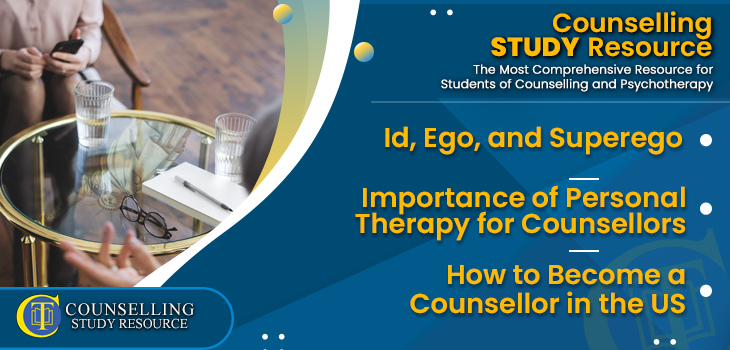205 - How to Become a Counsellor in the US
Id, Ego, and Superego – Importance of Personal Therapy for Counsellors
Returning with Episode 205 of the Counselling Tutor Podcast, Rory Lees-Oakes and Ken Kelly discuss three more topics for you to listen in on:
- In this week’s ‘Counselling Foundations’ we’ll be focusing on the work of Sigmund Freud on id, ego and superego.
- Next in ‘Focus on Self’ we’ll be exploring the purpose of personal therapy.
- And finally in ‘Practice Matters’ this week, Rory speaks with Robyn Symonds on how to become a counsellor in the US, and how training and practice differ from the UK.
Id, Ego, and Superego [starts at 1:38 mins]
During this segment, Rory and Ken set out the basics of id, ego and superego, helping to give a better understanding of these concepts in more detail through easy discussion.
The key points explored include:
- Ego as the middle ground.
- Superego refers to morals, ethics and principles.
- Id is a subconscious process.
- Plato’s original ideas in relation to Freud’s work.
- We’re not wholly biological, our personalities are shaped by our experiences.
A handout on Sigmund Freud’s Id, Ego and Superego is available to download in the green button above.
Benefits of Personal Therapy to Counsellors [starts at 13:37 mins]
Listen as Rory and Ken outline the benefits of personal therapy, both for yourself and for your clients, not just during training but perhaps even during your practice.
Points covered include:
- Personal therapy creates a safety net.
- Can help you gain an understanding of the client’s perspective.
- Can help when your own wounds are opened by new theories you may be learning.
- Be sure to take your full self into therapy in order to get the most out of it.
- Training is incredibly demanding, personal therapy may be a way to help you manage that.
- There is strength in seeking therapy.
How to Become a Counsellor in the US [starts at 27:02 mins]
In this week’s Practice Matters, join Rory as he speaks with Robyn Symonds on how to become a counsellor in the US. In this segment, they discuss some of the differences and similarities in counsellor training and practice:
- Regulation can vary in each state – clinical hours, tests, some states have levels of licensing, etc.
- Need a 4-year degree before you take a counselling master’s degree
- Will take around 2.5-3 years
- 700 hours of clinical practice
- The American Counselling Association create a code of ethics that is then regulated by each state.
- A difference between certification and licensure – licensure includes what you call yourself and what you can do, etc.


